Grandmaster
Deity
Civ: Carthage
Map: Marla Singer's Worldmap 3C3- Modified by Plexus, minorly modified by me
Difficulty: Monarch
Goal: Reverse history. Win the Punic Wars and make Carthage, not Rome, the dominant power in the Mediterannean.
Hannibal stood on a cliff overlooking the sea. He watched as the waves crashed against the shore. It had been those waves that brought his people here, many miles from their ancestral homelands. Long ago they had lived far away, in a land remembered now only in name: Phoenicia. Hannibal's ancestors had been traders, sailing throughout the Mediterannean Sea in search of new markets for Phoenician goods. Their ship, the Cartago, had been en route to an island called Sicilia when it had been caught in a tempest and thrown off course. This part of their history Hannibal's people remembered well. What came next was only legend, albeit legend that most people accepted as fact. The Cartago was said to have run aground, badly battered, some miles to the east. Here the survivors had tried to find food and shelter, but had been denied. The land was dry and barren, forsaken by the gods and ignored even by the desert lizards. The crew of the Cartago had wandered slowly westward, always in search of a place to camp. In a strange and distant land called Tripolitania they had come across other people. Alas, these people were not men like the civilized Phoenicians; they were barbarians, vicious murderers. They chased the few remaining members of the Cartago party from their lands, pursuing them all the way to the Gulf of Gabes. Here the barbarians had broken off their pursuit and returned home. The men, almost ready to give up, continued north along the coast, until one day their eyes fell upon a miraculous site. They crested a hill and from atop it spied a great valley. The valley was filled with lush pastureland and rich soil, and grew wild with wheat, grapes, and other produce. At the northern end of the valley was a tall cliff that over looked the sea. They also met here a local tribe, and over time intermarriage between the two peoples led to the creation of Hannibal's tribe.
And so here Hannibal was. His people had elected him as their leader, and bestowed upon him the title of General. He was responsible for their survival. His predecessors had protected these people by arming ever able-bodied man and training them to defend their own subsistance farm. But Hannibal had another plan. He would bring all the people together inside a large encampment, a city, and build a wall around it. The best warriors would serve to protect the city, the best farmers would feed everyone, and the best artisans would create manufactured goods. In this way, Hannibal believed his tiny tribe could grow to greatness. Perhaps they could even rival the long-lost utopia of Phoenicia itself.
It took some 100 years to build the city. The people of the tribe toiled in the heat of the sun to build homes, streets, and even a palace form which Hannibal could rule. Finally, in 4000 BC, the city was complete. The people asked Hannibal what they would call it. He know immediately that only one name would fit this great city: Carthage.
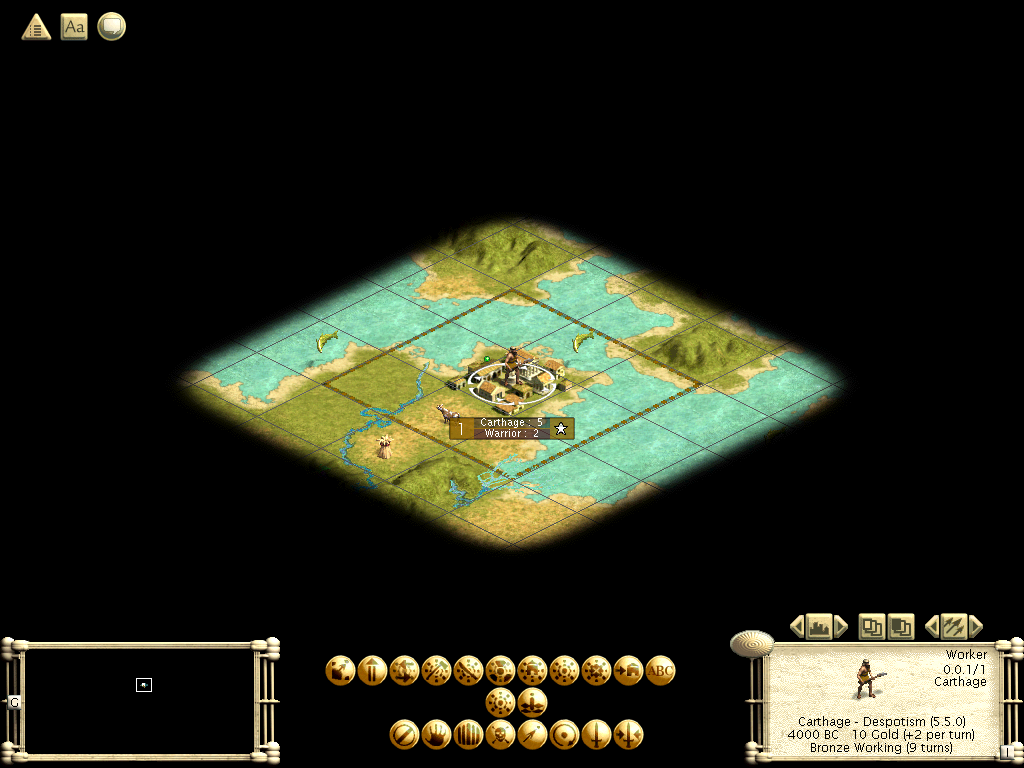
Map: Marla Singer's Worldmap 3C3- Modified by Plexus, minorly modified by me
Difficulty: Monarch
Goal: Reverse history. Win the Punic Wars and make Carthage, not Rome, the dominant power in the Mediterannean.
Hannibal stood on a cliff overlooking the sea. He watched as the waves crashed against the shore. It had been those waves that brought his people here, many miles from their ancestral homelands. Long ago they had lived far away, in a land remembered now only in name: Phoenicia. Hannibal's ancestors had been traders, sailing throughout the Mediterannean Sea in search of new markets for Phoenician goods. Their ship, the Cartago, had been en route to an island called Sicilia when it had been caught in a tempest and thrown off course. This part of their history Hannibal's people remembered well. What came next was only legend, albeit legend that most people accepted as fact. The Cartago was said to have run aground, badly battered, some miles to the east. Here the survivors had tried to find food and shelter, but had been denied. The land was dry and barren, forsaken by the gods and ignored even by the desert lizards. The crew of the Cartago had wandered slowly westward, always in search of a place to camp. In a strange and distant land called Tripolitania they had come across other people. Alas, these people were not men like the civilized Phoenicians; they were barbarians, vicious murderers. They chased the few remaining members of the Cartago party from their lands, pursuing them all the way to the Gulf of Gabes. Here the barbarians had broken off their pursuit and returned home. The men, almost ready to give up, continued north along the coast, until one day their eyes fell upon a miraculous site. They crested a hill and from atop it spied a great valley. The valley was filled with lush pastureland and rich soil, and grew wild with wheat, grapes, and other produce. At the northern end of the valley was a tall cliff that over looked the sea. They also met here a local tribe, and over time intermarriage between the two peoples led to the creation of Hannibal's tribe.
And so here Hannibal was. His people had elected him as their leader, and bestowed upon him the title of General. He was responsible for their survival. His predecessors had protected these people by arming ever able-bodied man and training them to defend their own subsistance farm. But Hannibal had another plan. He would bring all the people together inside a large encampment, a city, and build a wall around it. The best warriors would serve to protect the city, the best farmers would feed everyone, and the best artisans would create manufactured goods. In this way, Hannibal believed his tiny tribe could grow to greatness. Perhaps they could even rival the long-lost utopia of Phoenicia itself.
It took some 100 years to build the city. The people of the tribe toiled in the heat of the sun to build homes, streets, and even a palace form which Hannibal could rule. Finally, in 4000 BC, the city was complete. The people asked Hannibal what they would call it. He know immediately that only one name would fit this great city: Carthage.



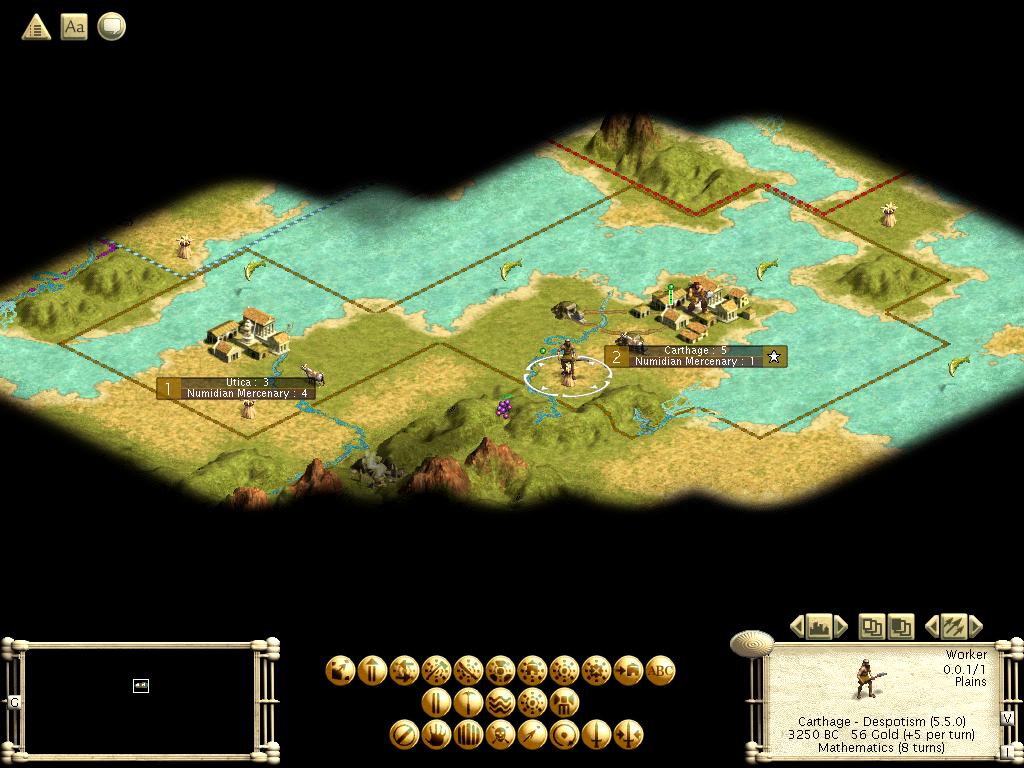
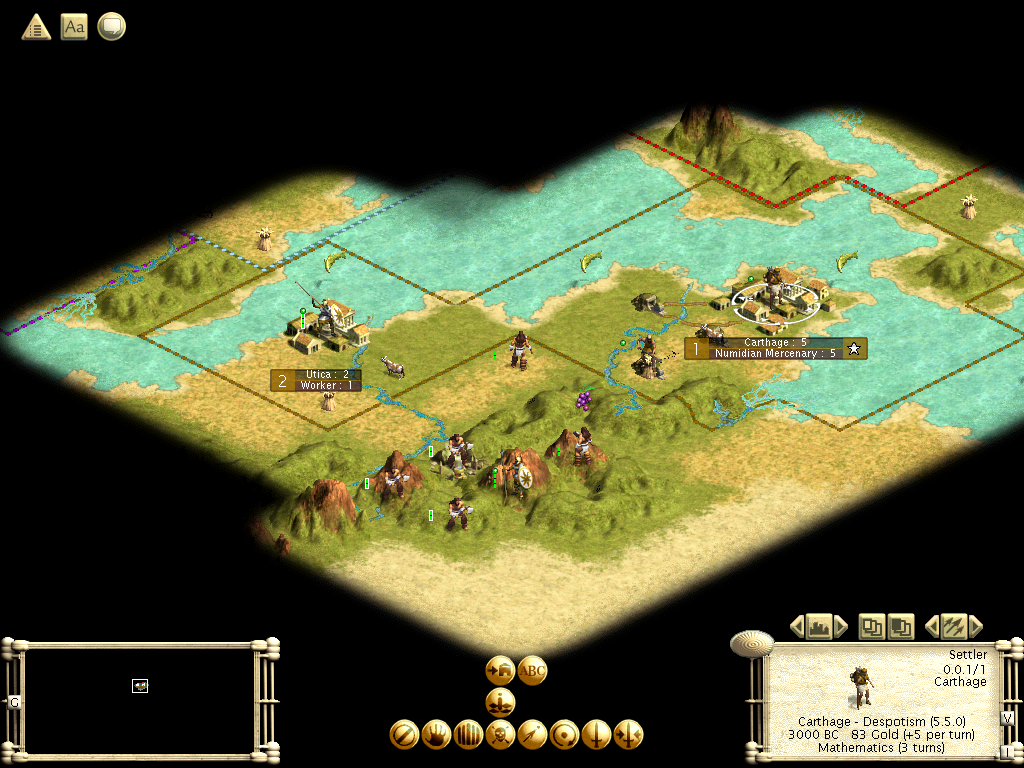
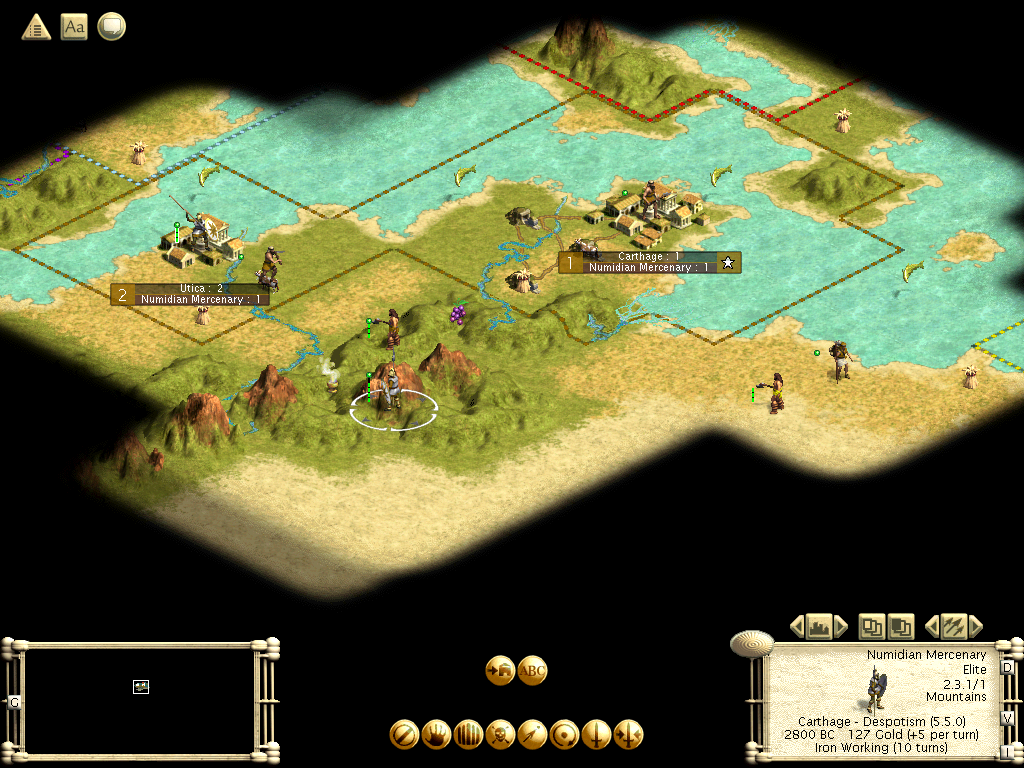

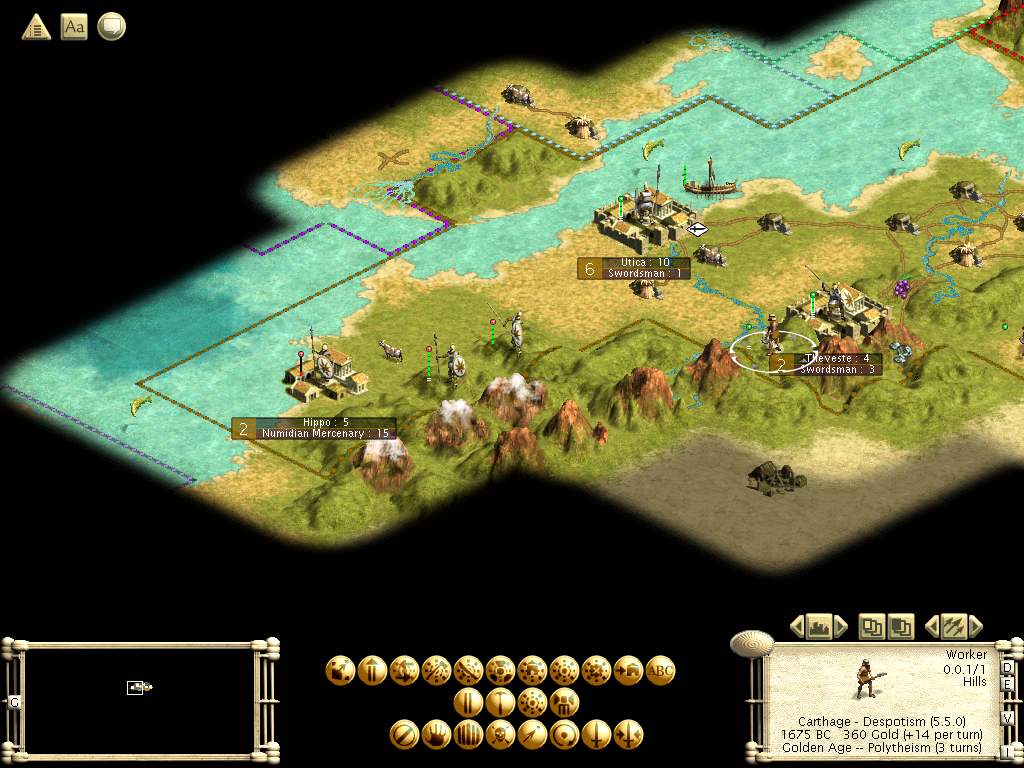
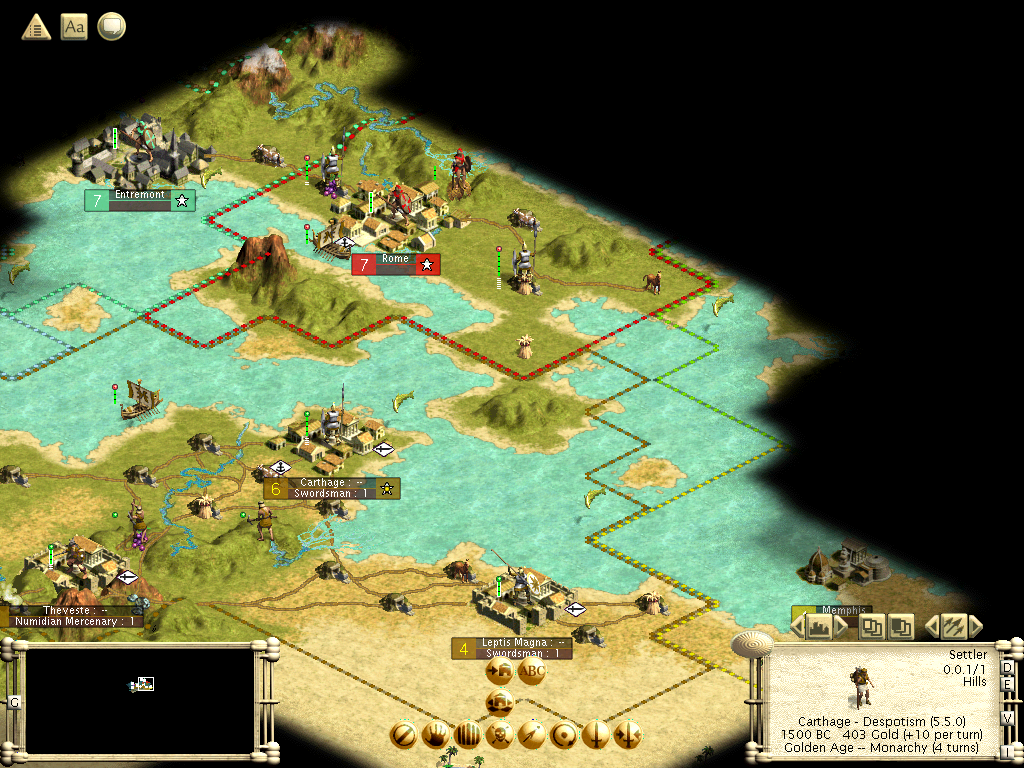
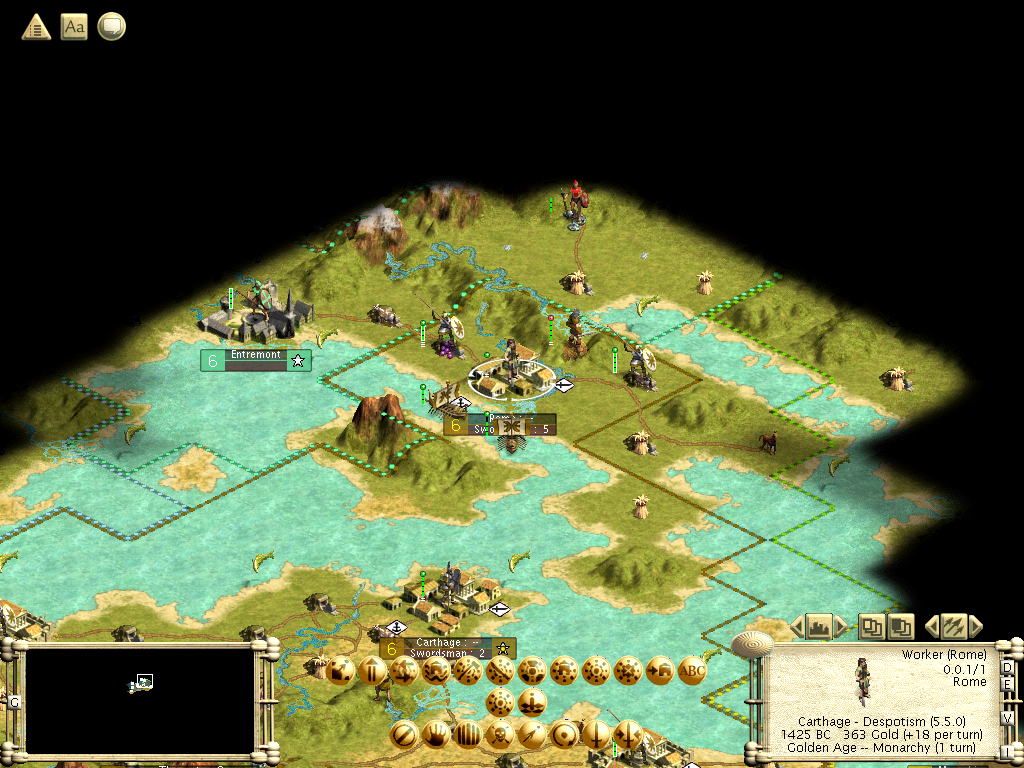

 Oh well I'm looking forward to reading how your game turns out.
Oh well I'm looking forward to reading how your game turns out.